Merry-Go-Round Blu-ray Movie
HomeMerry-Go-Round Blu-ray Movie 
Blu-ray + DVDArrow | 1981 | 160 min | Not rated | No Release Date
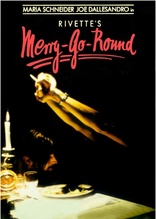
Price
Movie rating
6.5 | / 10 |
Blu-ray rating
| Users | 0.0 | |
| Reviewer | 2.5 | |
| Overall | 2.5 |
Overview
Merry-Go-Round (1981)
Elizabeth sends telegrams to her old boyfriend Ben in NYC and to her younger sister Leo in Rome to join her in Paris, where she is selling her dead father's estate. When Ben and Leo arrive, a mysterious adventure begins.
Starring: Maria Schneider, Joe Dallesandro, Danièle Gégauff, Françoise Prévost, Maurice GarrelDirector: Jacques Rivette
| Foreign | Uncertain |
| Drama | Uncertain |
| Crime | Uncertain |
Specifications
Video
Video codec: MPEG-4 AVC
Video resolution: 1080p
Aspect ratio: 1.37:1
Original aspect ratio: 1.37:1
Audio
French: LPCM Mono
Subtitles
English
Discs
Blu-ray Disc
Two-disc set (1 BD, 1 DVD)
DVD copy
Playback
Region A (B, C untested)
Review
Rating summary
| Movie | 2.0 | |
| Video | 4.5 | |
| Audio | 4.0 | |
| Extras | 2.5 | |
| Overall | 2.5 |
Merry-Go-Round Blu-ray Movie Review
Reviewed by Jeffrey Kauffman May 30, 2017Note: This film is available as part of
The
Jacques Rivette Collection.
According to several sources Cahiers du cinéma is the oldest publication devoted to film still being published. This venerable journalistic
institution was founded in the early fifties by André Bazin, Jacques Doniol-Valcroze and Joseph-Marie Lo Duca and soon employed a coterie of
intellectuals who would ultimately go on to redefine first French film and finally world cinema itself. Among the now legendary names associated
with
Cahiers du cinéma are Éric Rohmer (the magazine’s first editor), Jean-Luc Godard, François Truffaut and Claude Chabrol. A 1954 article
by
Truffaut is often credited with opening the analytical floodgates for what later became known as “auteur theory”, and as should already be evident
given the names listed above, several of the writers employed by Cahiers du cinéma went on to become foundational figures in the
movement known as
Nouvelle vague, the French New Wave. It’s perhaps a little strange, then, that the name of Jacques Rivette hasn’t quite penetrated the
typical American filmgoer consciousness in the same way that (especially) Godard and Truffaut have, since Rivette began writing for the magazine
as
early as 1953 and in fact became its editor around a decade later. Rivette was also reportedly the first writer for the magazine later associated
with
the French New Wave to actually matriculate into feature film making, with his Paris Belongs to Us. That film reportedly began production in 1958, well before François Truffaut’s The 400 Blows came out in 1959 and/or Jean-Luc Godard’s
Breathless appeared in 1960, though it wasn’t finished and
screened until 1961, perhaps robbing Rivette of some bragging rights which would have otherwise been his.
Like some of his (future) New Wave
counterparts, Rivette wasn’t especially pleased with the mainstream French film industry of the 1950s and also like some of his cohorts he tended
to
lionize larger than life Hollywood directors like Alfred Hitchcock and John Ford. As structurally innovative as Godard has been, it’s arguable that in
some ways Rivette was even more anarchic in his approach toward “traditional” filmmaking, introducing some almost gargantuan running times
while also letting his casts (which were often almost absurdly large) to improvise their way through whole sequences. If Godard’s approach toward
deconstruction might be thought of as often a post-production technique, Rivette attacked some of the presumptions of less ambitious filmmakers
from a more foundational perspective, questioning the actual production process itself. This new collection from Arrow gathers together three
interesting efforts from Rivette spanning the years from 1976 to 1983. The first two films in this set, Duelle and
Noroît, were initially meant to be part of a four part series wherein Rivette sought to once again reinvent film “grammar”, though the
series met an unexpected ending when Rivette suffered a debilitating breakdown on the set of the proposed third film (which somewhat
confusingly
was initially supposed to be the first to be released and which rather enticingly
would
have starred Albert Finney and Leslie Caron). Rivette’s psychological turmoil made the ultimate follow up production of Merry-Go-Round extremely troubled, as evidenced by the fact that filming
began
in 1978 but wasn’t completed until 1981 (with the film not getting an official theatrical release until a couple of years after completion).

Rivette aficionado and “Moishe the Explainer” Jonathan Rosenbaum relates an anecdote about the opening of Merry Go Round at the Museum of Modern Art where Rivette himself expressed disappointment in the film, calling it his worst, which perhaps takes at least a little heat off of me when I state that for all its kind of post-hippie chic elements, it’s pretty much a mess. Rosenbaum also mentions how Rivette confessed at another time that the only reason he got into directing films was so he could meet and work with actresses whom he admired, but in this case, Rosenbaum suggests it was actually Maria Schneider who approached Rivette about making a film, rather than vice versa. On its face, Merry Go Round would seem to offer more of a deliberate structure than some other Rivette outings, with Léo (Maria Schneider) and Ben (Joe Dallesandro) each receiving messages from Léo’s sister Elisabeth (Danièle Gégauff) to hie themselves to Paris to help her deal with the girls’ late father’s estate. When Elisabeth turns up missing and it appears that the girls’ father may have been involved in some illicit activity, a potentially interesting mystery is afoot.
As Jonathan Rosenbaum recounts in one of the supplements on this disc, Schneider was not a happy camper on this shoot, and her dissatisfaction led to all sorts of drama and (reportedly) some physical altercations. That may account not just for the at times meandering quality of the film, but perhaps even for the late appearance of Rivette regular Hermine Karagheuz as the appropriately named “other”, a kind of alternate Léo who shows up in some scenes that Rosenbaum cheekily compares to cartoons.
Merry-Go-Round Blu-ray Movie, Video Quality 
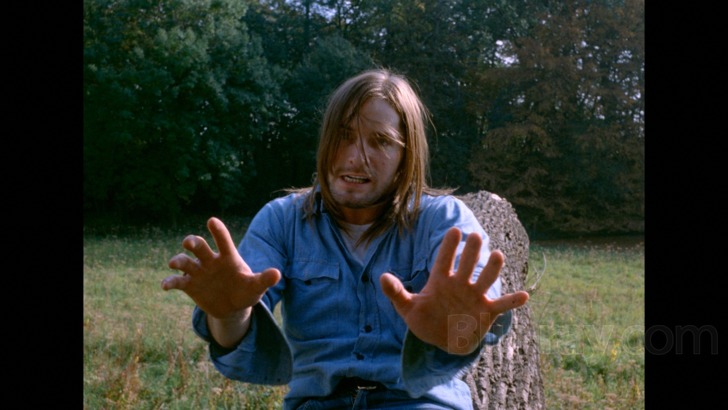
Merry-Go-Round is presented on Blu-ray courtesy of Arrow Academy with an AVC encoded 1080p transfer in 1.37:1. Arrow's insert booklet contains this information on all three films in the Jacques Rivette set:
The original camera negatives were scanned, graded and restored at 2K resolution. The majority of the picture restoration work was conducted on Diamant Film Restoration systems, with Phoenix and Flame software used on selected sequences.This is to my eyes the most consistent looking transfer of the three in the Jacques Rivette set. The "old school" aspect ratio is a little odd, especially given the at least potentially evocative locations Léo and Ben visit, but that said, the palette looks natural and well saturated throughout, densities are stable and Rivette actually employs a fair number of close-ups in this film, meaning fine detail is more readily apparent. Grain is at least a little finer in this presentation than the other two in the set, but there are no signs of any aggressive filtering. A few isolated moments of relative softness creep in, especially in some POV shots taken from various cars, but generally speaking this is a really nice looking transfer that offers an appealingly organic appearance and damage free elements.
Picture issues such as dirt, debris and scratches, torn frames, damaged splices, instability and mould were all corrected or minimised.
Colour grading was carried out using a P3 DCI colour space. 35mm original prints were used as a visual reference throughout by the colourist.
The original magnetic reels were too damaged for use, so the soundtracks were sourced from the original optical sound negatives and, in some cases, digital Betacam tapes produces in the 1990s. The majority of this work was carried out by L.E. Diapason in Paris.
Merry-Go-Round Blu-ray Movie, Audio Quality 
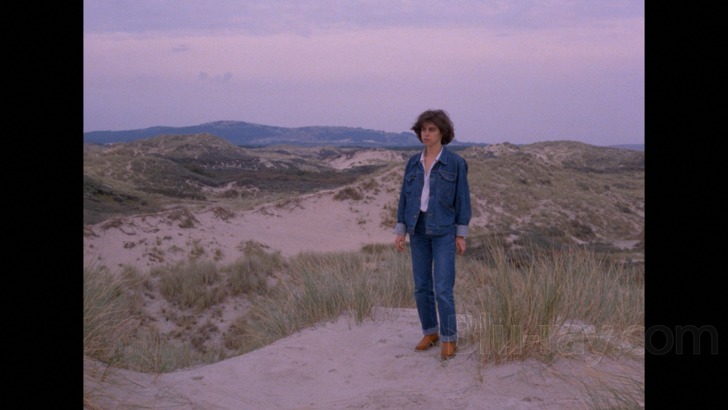
Merry-Go-Round's LPCM Mono track (in English and French, with English subtitles for the French portions) was the most consistently pleasing to my ears of the three films in the Rivette set, with little to none of the brittleness that can be heard in the audio for the other two films. Some of that may be due to the prevalence of low tones in the interstitial musical elements, played in this film by the unlikely combo of a bass clarinet and double bass. Rivette tends to use the music as segue material, though it occasionally bleeds over slightly into dialogue scenes, where it can occasionally mask what's being spoken. Otherwise, though, this is a clear sounding track that offers decent reproduction of ambient environmental effects and good support for spoken elements.
Merry-Go-Round Blu-ray Movie, Special Features and Extras 
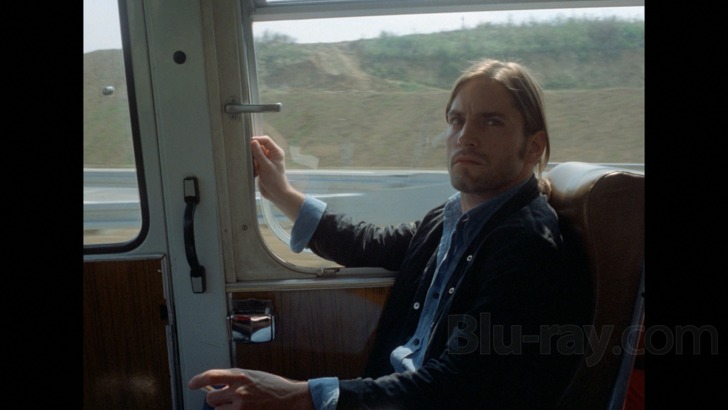
- Scenes from a Parallel Life (1080p; 51:43) cobbles together two really excellent interviews with Rivette, one from 1990 (with substandard video quality sourced from a workprint) and another from 2004. The first one is more generalist, touching on both Rivette's wider career as well as the films in this set, while the second one deals at least a little more directly with the proposed quartet of films which was never completed. Rivette freely alludes to his psychological issues, however circumspectly.
- Rosenbaum on Rivette (1080p; 22:25) offers Rivette aficionado Jonathan Rosenbaum, who has some really interesting things to say about Rivette. I'd love to know what the setting for this interview was, because Rosenbaum almost looks like he's "reclining" at a Seder and there are dishes clattering in the background.
Merry-Go-Round Blu-ray Movie, Overall Score and Recommendation 
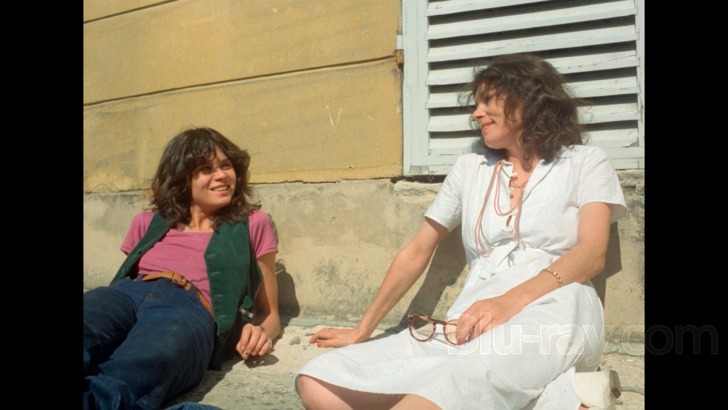
Merry-Go-Round is probably inarguably the weakest of the three films in this set, but this disc has what are arguably the two best supplements Arrow has gathered for the Rivette collection. The film itself is (as stated above) kind of a mess, but there's undeniable charisma in abundance from Dallesandro and Schneider, even if the "plot" mechanics could have used a tune up. Technical merits are generally the best of the three films in this set.
Similar titles
Similar titles you might also like
(Still not reliable for this title)

Out 1
Out 1, noli me tangere
1971

Duelle
Duelle (une quarantaine)
1976

Noroît
Noroît (une vengeance)
1976

Cemetery of Splendor
2015

Heroic Purgatory
煉獄エロイカ
1970

Le Gang
The Gang
1977

Maigret Sets a Trap
Inspector Maigret / Maigret tend un piège
1958

Dragnet Girl
非常線の女
1933

Le Pont du Nord
1981

Green Fish
초록 물고기 | 4K Restoration
1997

Dheepan
2015

Monos
2019

And Hope to Die
La course du lièvre à travers les champs
1972

Shanghai Triad
Yao a yao, yao dao wai po qiao / 摇啊摇,摇到外婆桥
1995

Heart of Glass
Herz aus Glas
1976

Pierrot le fou
1965

The Wild Goose Lake
南方车站的聚会 / Nán fāng chē zhàn de jù huì
2019

The Virgin Spring
Jungfrukällan
1960

Détective
1985

Stray Dogs
郊游 / Jiao you
2013